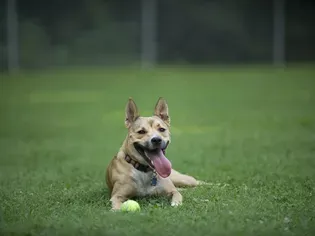Carolina Dog: Dog Breed Characteristics & Care
Updated on 04/26/24

Unveiling the Enigmatic Carolina Dog: A Comprehensive Guide to Breed Characteristics and Care
Introduction
The Carolina Dog, an ancient and enigmatic breed, has captivated hearts with its unique combination of wild beauty and domestic charm. This blog aims to provide a comprehensive overview of this fascinating breed, covering every aspect from its distinctive characteristics to its dedicated care requirements.
Historical Origins and Ancestry
The Carolina Dog, also known as the American Dingo or Yellow Dog, is believed to be descended from ancient pariah dogs that accompanied Native Americans to the Americas thousands of years ago. Genetic studies suggest that they are closely related to Asian dingos, adding to their mysterious and captivating history.
Physical Characteristics
* Size: Carolina Dogs are medium-sized, typically standing between 15-20 inches at the shoulder and weighing between 25-40 pounds.
* Build: They have a lean and muscular build, with a slightly elongated body.
* Coat: Their double coat is short and dense, with a wide range of colors from shades of yellow to brown, black, and white.
* Ears: Their ears are erect and pointed, giving them a watchful and alert expression.
* Tail: Their tail is bushy and curved, typically carried high.
Temperament and Behavior
* Independent: Carolina Dogs are known for their independent nature, inherited from their feral ancestors.
* Intelligent: They are highly intelligent and quick to learn.
* Loyal: Once bonded, Carolina Dogs form strong and loyal attachments with their owners.
* Protective: They have a protective instinct and may be wary of strangers.
* Social: While they can be social with other dogs, they may need early socialization to prevent potential aggression.
Care Requirements
* Exercise: Carolina Dogs require a significant amount of exercise to stay healthy and happy. Regular walks, hikes, or playtime in a secure area are essential.
* Grooming: Their short coat requires minimal grooming, but occasional brushing helps remove dead hair and keep it in good condition.
* Nutrition: A high-quality diet specifically designed for active dogs is recommended. Consult with a veterinarian for specific feeding recommendations.
* Health: Carolina Dogs are generally healthy and robust, but they may be prone to certain health conditions such as hip dysplasia and bloat.
* Training: Early socialization and training are crucial for Carolina Dogs to develop into well-adjusted and obedient companions. Use positive reinforcement and avoid harsh methods.
Examples of Breed Characteristics
* The Carolina Dog's keen sense of hearing and smell makes them excellent watchdogs.
* Their independent nature can make them challenging to train, but they are highly intelligent and capable of learning complex commands with patience and consistency.
* Their protective instinct extends to their family and territory, making them loyal and devoted companions.
* Their athleticism allows them to excel in agility and other canine sports.
* Their unique howl, similar to a wolf's, is a distinctive trait of the breed.
Conclusion
The Carolina Dog is a fascinating and versatile breed that combines the charm of a wild canine with the companionship of a devoted friend. Understanding their unique characteristics and providing them with the proper care is essential for a harmonious and fulfilling relationship. Through this comprehensive guide, we hope to empower you to make informed decisions and provide your Carolina Dog with the love and support it deserves.
Explore More Pets

Basic Training
Puppy and Baby Introductions

Working Dog Breeds
All About Search and Rescue Dogs

Dog Treatments
Puppy Vaginitis: Signs, Causes and Treatment

Dog Adoption
After More Than 1,200 Days in the Shelter, Coco Goes Home

Basic Training
How to Train Your Puppy to Go on Potty Pads

Hybrid Dog Breeds
The Difference Between a Mutt, Mixed Breed, or Designer Dog?

Dog Treatments
Nail Problems in Dogs

Puppies
7 Reasons Why Two Dogs Are Better Than One